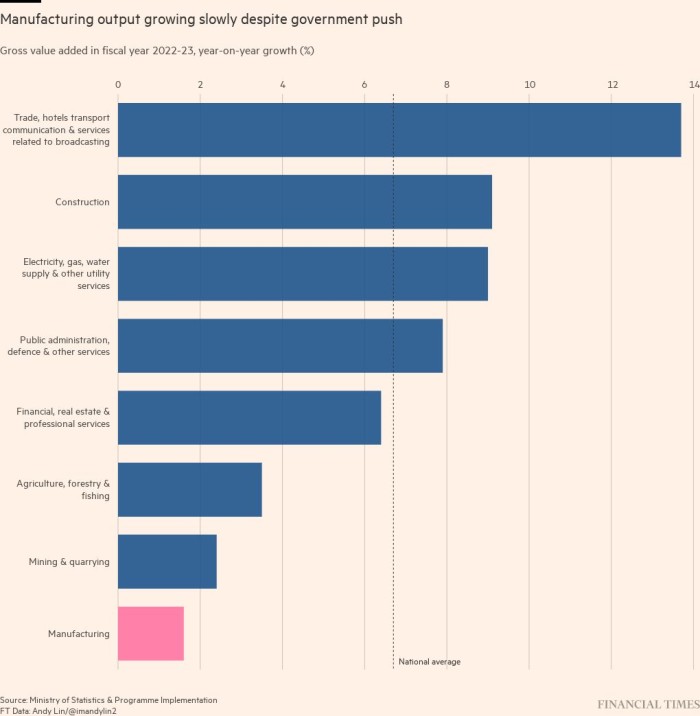[ad_1]
Kiran VB, 29, a resident of India’s tech capital Bangalore, had hoped to work in a manufacturing unit after ending highschool. But he struggled to discover a job and began working as a driver, ultimately saving up over a decade to purchase his personal cab.
“The market is very tough; everybody is sitting at home,” he mentioned, describing relations with engineering or enterprise levels who additionally failed to seek out good jobs. “Even people who graduate from colleges aren’t getting jobs and are selling stuff or doing deliveries.”
His story factors to an entrenched drawback for India and a rising problem for Prime Minister Narendra Modi’s authorities because it seeks re-election in simply over a yr’s time: the nation’s high-growth financial system is failing to create sufficient jobs, particularly for youthful Indians, leaving many with out work or toiling in labour that doesn’t match their expertise.
The IMF forecasts India’s economy will broaden 6.1 per cent this yr — one of many quickest charges of any main financial system — and 6.8 per cent in 2024.
However, jobless numbers proceed to rise. Unemployment in February was 7.45 per cent, up from 7.14 per cent the earlier month, in accordance with information from the Centre for Monitoring Indian Economy.
“The growth that we are getting is being driven mainly by corporate growth, and corporate India does not employ that many people per unit of output,” mentioned Pronab Sen, an economist and former chief adviser to India’s Planning Commission.
“On the one hand, you see young people not getting jobs; on the other, you have companies complaining they can’t get skilled people.”
Government jobs, coveted as a ticket to life-long employment, are few in quantity relative to India’s inhabitants of practically 1.4bn, Sen mentioned. Skills availability is one other concern: many corporations favor to rent older candidates who’ve developed expertise which can be in demand.
“A lot of the growth in India is driven by finance, insurance, real estate, business process outsourcing, telecoms and IT,” mentioned Amit Basole, professor of economics at Azim Premji University in Bangalore. “These are the high-growth sectors, but they are not job creators.”
Figuring out find out how to obtain better job development, significantly for younger individuals, might be important if India is to capitalise on a demographic and geopolitical dividend. The nation has a younger inhabitants that’s set to surpass China’s this yr because the world’s largest. More corporations need to redirect provide chains and gross sales away from reliance on Chinese suppliers and shoppers.
India’s authorities and states comparable to Karnataka, of which Bangalore is the capital, are pledging billions of {dollars} of incentives to draw buyers in manufacturing industries comparable to electronics and superior battery manufacturing as a part of the Modi authorities’s “Make in India” drive.
The state additionally recently loosened labour laws to emulate working practices in China following lobbying by corporations together with Apple and its manufacturing accomplice Foxconn, which plans to supply iPhones in Karnataka.
However, manufacturing output is rising extra slowly than different sectors, making it unlikely to quickly emerge as a number one generator of jobs. The sector employs solely about 35mn, whereas IT accounts for a scant 2mn out of India’s formal workforce of about 410mn, in accordance with the CMIE’s newest family survey from January to February 2023.
According to a senior official in Karnataka, extremely expert candidates with college levels are making use of to work as police constables.
The Modi authorities has proven indicators of being attuned to the problem. In October, the prime minister presided over a rozgar mela, or an employment drive, the place he handed over appointment letters for 75,000 younger individuals, meant to showcase his authorities’s dedication to creating jobs and “skilling India’s youth for a brighter future”.
But some opposition figures derided the gesture, with the Congress social gathering president Mallikarjun Kharge saying the appointments had been “just too little”. Another politician referred to as the honest “a cruel joke on unemployed youths”.
Rahul Gandhi, the scion of the household behind the Congress social gathering, has signalled that he intends to make unemployment some extent of assault for the upcoming election, by which Modi is on observe to win a 3rd time period.
“The real problem is the unemployment problem, and that’s generating a lot of anger and a lot of fear,” Gandhi mentioned in a question-and-answer session at Chatham House in London final month.
“I don’t believe that a country like India can employ all its people with services,” he added.
Ashoka Mody, an economist at Princeton University, invoked the phrase “timepass”, an Indian slang time period that means to go time unproductively, to elucidate one other phenomenon plaguing the roles market: underemployment of individuals in work not befitting their expertise.
“There are hundreds of millions of young Indians who are doing timepass,” mentioned Mody, creator of India is Broken, a brand new e book critiquing the financial insurance policies of successive Indian governments since independence. “Many of them are doing so after multiple degrees and colleges.”
Dildar Sekh, 21, migrated to Bangalore after finishing a highschool course in laptop programming in Kolkata.
After dropping out within the intense competitors for a authorities job, he ended up working at Bangalore’s airport with a floor dealing with firm that assists passengers in wheelchairs, for which he’s paid about Rs13,000 ($159) monthly.
“The work is good, but the salary is not good,” mentioned Sekh, who goals of saving sufficient cash to purchase an iPhone and deal with his dad and mom to a helicopter trip.
“There is no good place for young people,” he added. “The people who have money and connections are able to survive; the rest of us have to keep working and then die.”
Additional reporting by Andy Lin in Hong Kong and Jyotsna Singh in New Delhi
[adinserter block=”4″]
[ad_2]
Source link


